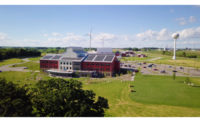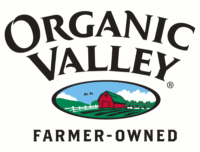Organic Valley, a La Farge, Wis.-based cooperative of organic dairy and other organic farmers, announced a first-of-its-kind community partnership that will enable it to become the largest food company in the world to source 100 percent of its electricity from renewable sources. In doing so, Organic Valley said it is embarking on an aggressive path to become carbon-neutral.
"Our future demands bold new thinking about our sources of energy, and there is nothing more natural to a farmer than harnessing the power of the sun and the wind," said George Siemon, CEO and a founding farmer of Organic Valley. "So our cooperative is committed to achieving 100 percent renewable power, and doing it in partnership with the rural communities where we live and work."
Organic Valley said it is collaborating with the Upper Midwest Municipal Energy Group (UMMEG) and OneEnergy Renewables to create the new community solar partnership. Together, the partners will initiate over 12 megawatts (MW) of solar installations in Wisconsin. The electricity created by this partnership will not only enable Organic Valley to cover 100 percent of its electric energy needs from renewable sources by 2019, but also increase overall solar energy use in Wisconsin by 15 percent.
Beyond the 12-MW project portfolio, an additional 17-plus MW is expected to be constructed as well, resulting in nearly 30 MW of new solar in the region. Critical to this partnership, Organic Valley said it will purchase renewable energy credits from the solar projects near its headquarters and distribution center, enabling the cooperative to be fully renewable-powered.
As a result of the partnership, all participating communities will receive lower and more stable electric costs and the environmental benefits of renewable power. Additionally, the community solar partnership will adopt pollinator-friendly solar standards as part of Organic Valley's commitment to animals, people and the planet.
Rather than being planted with turf grass or covered in gravel, the installations will incorporate pollinator-friendly habitat into the design, Organic Valley said. Once complete, these meadows, filled with native flowering plants and grasses, will create a bee and butterfly habitat equivalent to 30,000 families each planting a 6-by-12-foot pollinator garden.
"Organic Valley was built on an environmental ethic, promoting ecological and economic sustainability," said Jonathan Reinbold, head of sustainability, Organic Valley. "As leaders in food and farming, it is our responsibility to pioneer change for good. Our hope is that this partnership to install community-scale solar will be replicated by municipal utilities around the country and propel more rural communities toward economic stability and energy independence."


